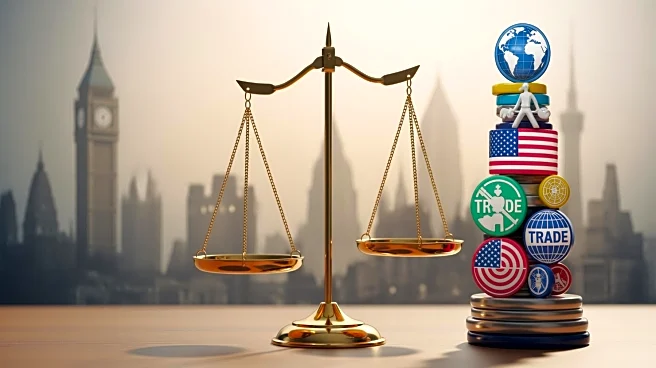What's Happening?
The Supreme Court is currently reviewing a case that questions the extent of presidential power under the International Emergency Economic Powers Act of 1977 (IEEPA) to impose tariffs. The Trump administration has used IEEPA to justify tariffs on the grounds
of national security threats, such as trade imbalances and drug trafficking. The case has drawn significant attention from both conservative and liberal justices, as well as business leaders who argue that these tariffs are detrimental to U.S. businesses and consumers. The U.S. Chamber of Commerce and the National Retail Federation have expressed concerns that the tariffs create uncertainty and financial strain on businesses. The case could redefine the balance of power between Congress and the presidency regarding trade policy.
Why It's Important?
The outcome of this Supreme Court case could have far-reaching implications for U.S. trade policy and the separation of powers. If the court upholds the president's authority to impose tariffs under IEEPA, it could set a precedent for future administrations to unilaterally impose tariffs based on their own national security assessments. This could lead to increased executive power at the expense of congressional oversight. Businesses, particularly those reliant on international supply chains, could face continued uncertainty and financial challenges. The decision could also influence how future administrations address other issues, such as climate change, under the guise of national emergencies.
What's Next?
A decision from the Supreme Court is expected in the coming weeks or months. Depending on the outcome, Congress may seek to reclaim some of its authority over trade policy. Business groups are likely to continue advocating for clearer and more predictable trade policies. The case could also prompt discussions about the broader implications of executive power and the need for checks and balances in government.
Beyond the Headlines
The case highlights the ongoing debate over the balance of power between the executive and legislative branches. It raises questions about the potential for executive overreach and the importance of maintaining a system of checks and balances. The decision could also influence how future administrations approach international trade and economic policy, potentially affecting global trade relations and the U.S. economy.















